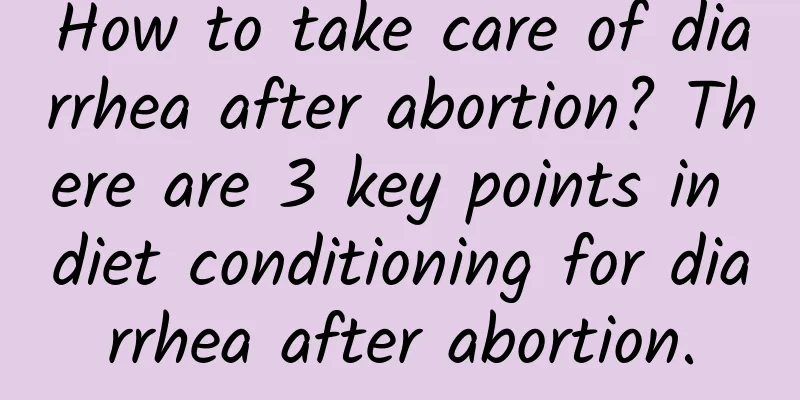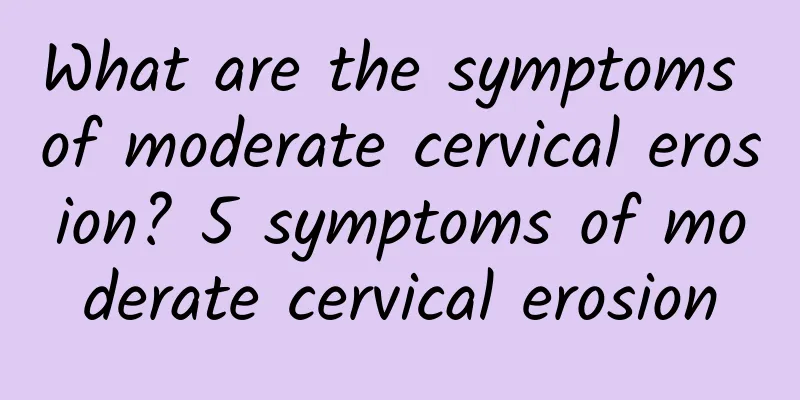How to take care of diarrhea after abortion? There are 3 key points in diet conditioning for diarrhea after abortion.

|
Abortion is actually a relatively common gynecological surgery nowadays, but we all know that such an operation actually has very serious impacts and harms on women, especially if you do not pay attention to various post-operative care and health care, and even many other adverse infections may occur. Some people are prone to diarrhea after abortion, or other phenomena, so various post-abortion care work must be paid attention to. You must take medicine according to the doctor's advice, and go to a regular hospital for a checkup two weeks after the operation to rule out the possibility that the abortion was not complete. You must also take good care of your diet: After an abortion, you must still make reasonable arrangements for the quantity, quality, and combination of various foods to meet the body's needs for protein, carbohydrates, fat, vitamins, inorganic salts, water, and cellulose. In order to promote recovery after an abortion, dietary adjustments should focus on the following points: (1) Protein is an important component of antibodies. If it is not taken in enough, the body's resistance will be reduced. Within half a month after artificial abortion, protein should be given at 1.5 to 2 grams per kilogram of body weight, and the daily amount is about 100 to 150 grams. Therefore, you can eat more chicken, lean pork, eggs, milk, beans, bean products, etc. (2) After an artificial abortion, the body is weak and prone to sweating. Therefore, water should be replenished in small amounts and multiple times to reduce water evaporation; sweat excretes a large amount of water-soluble vitamins, especially vitamin C, vitamin B1, and vitamin B2. Therefore, you should eat more fresh vegetables and fruits. This is also helpful to prevent constipation. (3) On the basis of a normal diet, appropriate fat restriction should be applied. Fat intake should be controlled at about 80 grams per day within one week after surgery. Patients with menstrual disorders should avoid irritating foods, such as chili peppers, wine, vinegar, pepper, ginger, etc. These foods can stimulate congestion of the sexual organs and increase menstrual volume. Cold foods such as crabs, snails, and river clams should also be avoided. |
Recommend
Long-term overtime work can easily lead to uterine fibroids
With the increase of work pressure, overtime work...
What are the classifications of ovarian cysts?
Ovarian tumors are common tumors of the female re...
What are the causes of uterine fibroids and what are the Chinese and Western treatments for uterine fibroids?
Hematogenous infection of uterine fibroids is rel...
What are the transmission routes of Trichomonas vaginitis?
For an infectious disease to spread, there must b...
How to regulate less menstruation to make it more
Light menstrual flow is a problem that many women...
What to do if uterine prolapse occurs
What should I do if I have uterine prolapse? Firs...
Timely treatment of cervicitis will not affect the couple's life
As we all know, cervicitis is very harmful. If yo...
The causes of secondary dysmenorrhea in women cannot be ignored
What are the causes of secondary dysmenorrhea in ...
What happened if menopause came back again after one and a half years of menopause?
What happened if menopause came back again after ...
How long after abortion can I get pregnant again? What kind of care is needed after abortion?
Abortion is a disaster for expectant mothers. Man...
Is vulvar leukoplakia hereditary?
Can vulvar leukoplakia be inherited? Vulvar leuko...
Experts explain the main high-risk groups for cervical erosion
Some female friends are at high risk of cervical ...
The cost of treating cervical erosion
Cost of treating cervical erosion: 1. Cervical er...
How to treat uterine fibroids? What is the treatment for uterine fibroids?
Uterine fibroids are a common disease. Uterine fi...
Experts reveal the specific dangers of cervical hypertrophy
It is understood that many patients with cervical...









